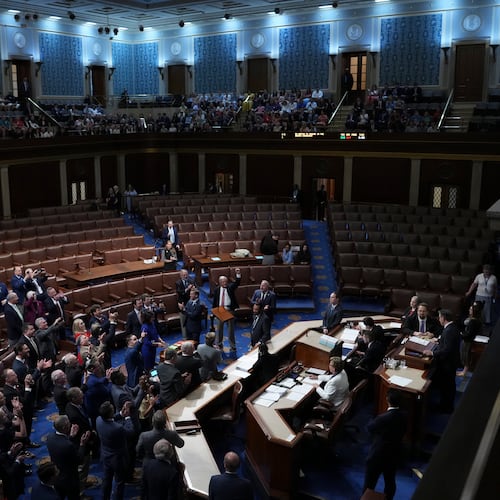Last week, I received my updated coronavirus shot. The decision was straightforward: I recently suffered a bad bout of bacterial pneumonia and am still on steroid medications for ongoing lung problems. The last thing I want is to be hospitalized again for another lung infection. The coronavirus vaccine will reduce that risk.
It will also reduce my chances of being infected with the coronavirus, but it won’t eliminate the possibility. In fact, many people who are up-to-date with their coronavirus vaccines will still contract the virus. This should not be a surprise and does not negate the upside of vaccination.
Rick from Maryland is among the many readers who expressed bewilderment about becoming infected despite vaccination. “My wife and I are both in our 80s with diabetes,” he wrote. “We got the new vaccine as soon as it became available. Not even two weeks later, we both tested positive. We are fine other than for a stuffy nose, but we are wondering what happened. Some of our family members are against vaccines, and they are using our experience to explain why they are not getting vaccinated.”
Credit: contributed
Credit: contributed
Rick brings up an important point: We need to be clear about what the coronavirus vaccines do and what they don’t. As with every medical intervention, health-care providers must set expectations so that people don’t view anticipated outcomes - in this case, testing positive - as failures.
The most important reason to stay up-to-date on coronavirus vaccines (and the flu vaccine and RSV vaccine, for that matter) is to reduce your risk of hospitalization and death. On this front, the coronavirus vaccine has delivered consistently strong results. The Centers for Disease Control and Prevention reports that the bivalent vaccine reduced the chance of critical illness by 69 percent in the week to 59 days following the shot. The protection remained three to four months later, though it diminished to 46 percent.
These numbers are comparable with the flu vaccine. CDC data show that last year’s flu vaccine was 43 percent effective at preventing hospitalization among adults. People vulnerable to severe outcomes, which includes everyone 65 and older as well as those with chronic medical conditions, should receive the new coronavirus vaccine for this reason alone.
Early on in the pandemic, reducing the risk of infection was a compelling reason to get the shot. When vaccines were first authorized at the end of 2020, they appeared to be more than 90 percent protective against contracting the coronavirus.
That’s no longer the case. A recent study by the Cleveland Clinic found that the bivalent vaccine reduced the chances of infection by 4 to 29 percent. The updated vaccine, which targets currently circulating variants, will probably have higher efficacy, especially in the two weeks to two months following the shot. But avoiding infection is far from a guarantee.
Still, that shouldn’t discourage people from getting the shot.
There seems to be reluctance at communicating the limitation of the coronavirus vaccine for fear that it could further fuel anti-vaccine sentiment. While I’m sympathetic to this line of thinking, there’s a danger to deliberately overstating the vaccine’s effectiveness.
That’s because clinicians have a duty to communicate honestly with our patients. The last thing we want is for vulnerable people to mistakenly think that they are shielded from infection when they cannot rely on vaccination alone. Tom from New York is a 79-year-old with emphysema and congestive heart failure who is receiving treatment for bladder cancer. He wrote about the relief he felt after receiving the new vaccine, noting that he felt it was finally “safe” to attend operas without a mask.
He is not “safe.” Someone like Tom needs to keep avoiding the coronavirus and should take additional precautions. I’d urge him to continue wearing an N95 or equivalent mask while at the opera. And he should know how to access antiviral treatment if he became infected.
I’d encourage similar caution to anyone who wants to prevent infecting others in their household. A recent vaccine does reduce their risk of infection and therefore transmission to others, but they might wish to take additional precautions.
In addition to giving high-risk people a false sense of security, an inaccurate portrayal of the coronavirus vaccine’s efficacy could embolden people spreading misinformation about vaccines. As Rick wrote, his relatives are using his experience as “proof” that vaccines don’t work; this is a common refrain in anti-vaccine messaging.
In reality, Rick and his wife are vaccine success stories because all they experienced were stuffy noses. Had they not received the vaccine, given their age and vulnerability, they could have had bad coughs, shortness of breath or worse.
The public health community needs to do a better job of explaining the benefits of coronavirus vaccination as well as its limitations. This is essential to helping patients understand their level of protection and how much more, if any, they might need. Transparency and clarity are also key to rebuilding trust in vaccine science.
Leana S. Wen, M.D., is a professor at George Washington University’s Milken Institute School of Public Health. Previously, she served as Baltimore’s health commissioner. She wrote this for The Washington Post.
About the Author
Keep Reading
The Latest
Featured



